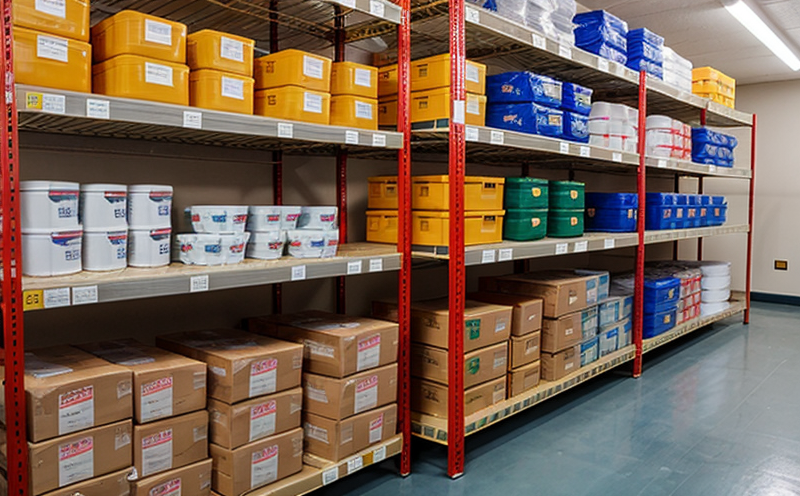Injectable Stability Testing
Injectable stability testing is a critical component of pharmaceutical development and quality assurance. The primary objective of this service is to evaluate the chemical, physical, and microbiological stability of injectable products over time under various environmental conditions. This ensures that the product maintains its efficacy, safety, and potency throughout its shelf life.
The process involves subjecting the injectable formulation to controlled temperature, humidity, light, and other stress conditions for extended periods. By doing so, it helps identify potential degradation pathways and assesses the impact of environmental factors on drug stability. This testing is essential for compliance with regulatory requirements such as those set by the FDA, EMA, and WHO.
Stability studies are typically conducted at different time points during product development to monitor changes in critical quality attributes (CQAs) over time. These attributes include solubility, dissolution rate, pH stability, sterility, and microbiological quality. The testing also aims to establish the shelf life of the injectable formulation based on the results obtained.
The methodology for injectable stability testing includes the following key steps:
- Sample preparation
- Stress incubation under various conditions (temperature, humidity, light)
- Sampling and analysis at predetermined intervals
- Data evaluation and interpretation
- Determination of shelf life based on stability data
The use of advanced analytical techniques such as High-Performance Liquid Chromatography (HPLC), Fourier Transform Infrared Spectroscopy (FTIR), and Differential Scanning Calorimetry (DSC) is essential for accurate and reliable results. These instruments provide detailed insights into the structural integrity and purity of the injectable formulation.
| Method | Description | Use Case |
|---|---|---|
| HPLC | Detects and quantifies the presence of impurities and degradation products. | Evaluating purity over time. |
| FTIR | Identifies chemical bonds and structural changes in the drug substance. | Monitoring structural stability under stress conditions. |
| DSC | Marks changes in thermal properties such as melting point and crystallinity. | Evaluating physical state transitions during storage. |
Why It Matters
The importance of injectable stability testing cannot be overstated. Ensuring the stability and safety of injectable formulations is crucial for patient health and product efficacy. Poorly characterized or unstable injectables can lead to adverse reactions, reduced therapeutic efficacy, and increased healthcare costs.
Regulatory bodies worldwide require comprehensive stability data before approving a new drug for market release. This ensures that the product meets stringent quality standards and remains safe and effective throughout its shelf life. Proper stability testing also helps manufacturers optimize formulation and manufacturing processes to enhance product performance.
In addition, accurate stability studies provide valuable insights into potential issues that may arise during long-term storage or transportation conditions. This information is vital for ensuring the integrity of injectable products in real-world scenarios.
| Regulatory Compliance | Expected Outcomes |
|---|---|
| FDA, EMA, WHO Guidelines | Compliance with regulatory requirements ensuring product safety. |
| Data for Shelf Life Determination | Achieving accurate shelf life predictions to optimize storage conditions. |
Industry Applications
The pharmaceutical industry heavily relies on injectable stability testing to ensure the quality and safety of its products. This service is particularly important for biopharmaceuticals, monoclonal antibodies, vaccines, and gene therapies that are administered by injection or infusion.
| Product Type | Testing Requirements |
|---|---|
| Biopharmaceuticals | Assessment of protein aggregation and degradation. |
| Vaccines | Evaluation of stability under refrigeration conditions. |
| Gene Therapies | Monitoring nucleic acid integrity during storage. |
Use Cases and Application Examples
- Evaluation of stability for monoclonal antibodies under accelerated conditions (40°C, 75% relative humidity).
- Determination of shelf life for a new vaccine formulation using real-time stability testing.
- Investigation of potential degradation pathways in gene therapy products during long-term storage at room temperature.
| Use Case | Objective |
|---|---|
| Evaluation of stability for monoclonal antibodies under accelerated conditions (40°C, 75% relative humidity). | To assess the impact of temperature and humidity on product stability. |
| Determination of shelf life for a new vaccine formulation using real-time stability testing. | To establish the maximum shelf life under defined storage conditions. |
| Investigation of potential degradation pathways in gene therapy products during long-term storage at room temperature. | To identify and mitigate potential quality risks associated with storage at ambient temperatures. |





